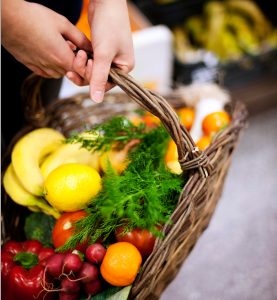“Failing to plan is planning to fail” ~ Benjamin Franklin
Why Meal Planning is Helpful
 When shifting to a whole foods based diet meal planning can make our goals a lot more achievable. Whole foods diets use minimally processed foods that often do not come from a package, which involves some planning and preparation on our part. This may be the biggest barrier to success for those trying to incorporate more of these foods into their diet.
When shifting to a whole foods based diet meal planning can make our goals a lot more achievable. Whole foods diets use minimally processed foods that often do not come from a package, which involves some planning and preparation on our part. This may be the biggest barrier to success for those trying to incorporate more of these foods into their diet.
Unless you are fortunate enough to have access to a kitchen for all of your meals throughout the day, chances are you will have to do some meal planning in order to incorporate fresh, whole foods into your diet.
In our busy modern lives, it is okay to take a few short cuts with canned or frozen foods or use pre-cut, packaged produce from the grocery store. As we move away from the processed food in our diets we will need to have some aspect of planning ahead to help us be successful. After all, it is so much easier to drive past that fast food chain when you have a plate of food waiting for you at home.
How to Meal Plan
There are a number of ways to meal plan, the best way for you may be vastly different for someone else. Individuals have unique lifestyles and health goals. I will walk through several methods including a few services that are available for subscription, but ultimately what works will be based on individual needs and may take a few trial and error attempts.
The concept of meal planning is that all of your meals for the week are planned out. I recommend sitting down on an afternoon or evening where you can dedicate about an hour to meal plan. Ask yourself the following questions. How many days do you want to cook for? How many meals do you want to cook? How much do you want to cook? Are you okay with eating the same thing for several meals in a row? How many meals in a row? Some people like to plan out and do all of their cooking on a Sunday and that is their food for the entire week, others like to cook dinner every night and then plan to take leftovers for lunch the next day.
The key is simply taking the time to plan ahead. Begin by looking at your schedule for the next few days for a time you will be able to grocery shop and cook. Next, take an inventory of your kitchen to determine what you already have to work with and decide how much time you would like to dedicate to cooking, be realistic here. It’s not helpful to browse through gourmet recipes when you really only want to spend 20 minutes on Monday night preparing dinner.
Finally, based on all of the information you have accumulated, decide what you would like to eat and cook. The most challenging part for some people is coming up with the shopping list. I have included a few of my favorite blogs that I frequent for simple meals for week nights. One pot meals and crock pot meals are great place to start if you are new to meal planning and want simple and affordable options.
As you are changing our habits and incorporating new behaviors, routine is key. Figure out what works for you and your family and stick to it. It may take a few weeks of trial and error, but be persistent. It is okay to stick to the same meals week after week if that is what’s working for you. The entire point of meal planning is to set aside time to mindfully plan out your meals to alleviate the stress of trying to figure out what’s for dinner at 5:45 p.m. on your way home from work.
Meal Planning Tools (Websites and Apps)
Whole Foods Blogs (Healthy Recipe Ideas)
- Whole30 Recipes Instagram feed
- Nom Nom Paleo website
- Love and Lemons website
- Against All Grain website
- The Kitchn website
How I Meal Plan
I like to do my meal planning and grocery shopping on Sunday. I am a busy grad student on a budget, so I like to keep my meal prep simple, stress free and affordable. I typically eat the same thing over and over. This works best for me at this point in my life because I don’t have a lot of time to be creative. I also am realistic about the fact that by Friday I am mostly likely to want to go out to eat. I like to cook a few things on Sundays that will last for the week, this is often roasted chicken, pulled pork, or chili that I can mix up with various toppings and side dishes. I also love roasted veggies and roast a large batch of whatever is on sale at the store that week. I like to snack so I make sure to include that on my planning sheet. I have learned that if I don’t bring a snack with me during the day I am much more likely to eat something less healthy and spend money unnecessarily. To prevent complete food boredom I add fun dressings, hot sauces and toppings to my food to mix it up from day to day.
- Total time spent meal prepping (not including cooking time): 10 minutes to plan, 45 minutes at the grocery store, 1 hour of prep for everything on Sunday.
- Average time I take to make breakfast and pack my lunch: 12 minutes
- Average time to make dinner: five minutes, as I am just reheating whatever I have from the fridge
- Cost per week on groceries: $50
About the Author
Mallory Aye is a student in the naturopathic medicine program at National University of Natural Medicine (NUNM). She has worked for the Food as Medicine Institute for the past four years and loves working with the community, teaching people the value and importance of cooking with whole foods. Her food philosophy is that there is no one size fits all diet, but that everyone can benefit from adding more whole foods into their diet. She loves empowering people by helping them realize how they can improve their health through the food they eat.

